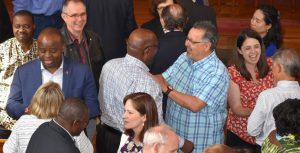By Thomas Lambrecht –

The Commission on a Way Forward members were from The United Methodist Church around the world, both clergy and laity. Photo by Maidstone Mulenga, United Methodist Council of Bishops.
Of the 99 petitions submitted to the special called General Conference in St. Louis on February 23-26, 78 have been cleared to be considered by that body. This includes all the main plans and proposals that have been under consideration.
A special called session of General Conference can deal with only those matters that are part of the call. In this case, the call was for the purpose of “receiving and acting upon a report from the Commission on a Way Forward based upon recommendations of the Council of Bishops.” A May 2018 Judicial Council decision clarified that “It is the obligation of the General Conference to determine, in the first instance, through its committees, officers and presiders, acting in accordance with The Discipline and the rules and procedures of the General Conference, whether any such petition is ‘in harmony.’ However, business not in harmony with the purpose as stated in the call is not permitted unless the General Conference by a two-thirds vote shall determine that other business may be transacted” (Decision 1360).
The Commission on General Conference assigned the Committee on Reference the responsibility of determining which of the 99 petitions are “in harmony” with the call and thus able to be considered. That committee met January 11-12 and made its determination.
All of the 48 petitions related to the three plans submitted by the Commission on a Way Forward are “in harmony.” This includes the One Church Plan, the Connectional Conference Plan, and the Traditional Plan.
Of the remaining 51 petitions, one was ruled invalid because of technical errors.
 In order to be “in harmony,” the committee said the petition needed to meet at least one of three criteria:
In order to be “in harmony,” the committee said the petition needed to meet at least one of three criteria:
1) submitted by the Commission on a Way Forward (COWF)
2) the content of the petition directly addresses inclusion or exclusion of LGBTQ persons, or
3) the content of the petition seeks to correct or perfect COWF plans for the continuing existence of The United Methodist Church.
Of the remaining 50 valid petitions, 30 were found to be “in harmony” and thus able to be considered by the General Conference. These include the following general areas:
- Two petitions that would modify and strengthen the Traditional Plan, called the Modified Traditional Plan, submitted by Maxie Dunnam
- One petition for an alternative type of traditional plan submitted by Lonnie Brooks
- Four petitions that make the language in the Book of Discipline stronger in a more traditional direction
- Eight petitions that make up the Simple Plan, which would allow same-sex marriage and the ordination of practicing homosexuals, redefinemarriage as between “two adults,” and would seem to permit other types of sexual relationships outside of monogamous marriage, while providing no conscience protections for a traditionalist viewpoint
- Three petitions that make up the Fully Inclusive Way Forward, which removes all prohibitions against same-sex marriage and the ordination of practicing homosexuals
- Seven petitions that make the language in the Book of Discipline more progressive, with such suggestions as permitting Deacons to perform same-sex weddings, adding “sexual orientation” and “gender identity” to the requirement for inclusiveness, redefining marriage, and removing the chargeable offenses against performing same-sex weddings or being a self-avowed practicing homosexual clergyperson
In addition to the above petitions, five petitions providing for different pathways for congregations to exit from the denomination with their property were also declared “in harmony” and will be considered. A future article will review the various exit plans.
Based on criterion #3 above, two petitions that provide a mechanism for an amicable separation that would dissolve The United Methodist Church and create two or more new churches was declared “not in harmony” and will not be considered. It would require a 2/3 majority vote to consider these petitions. Such a 2/3 vote would also be required in order to pass the proposal for amicable separation, so if it comes to that point, it would still be a viable alternative with the backing of a supermajority of the delegates.
The good news is that all the petitions that the Renewal and Reform Coalition believes need to be considered are able to be considered. The General Conference will be able to fairly evaluate many different options for resolving the church’s conflict and creating a way for the church to move forward with vitality and faithfulness.
The Renewal and Reform Coalition is supporting the Modified Traditional Plan, which maintains the current biblically-based teaching of the church regarding human sexuality, marriage, and ordination. It contains enhanced accountability provisions that would help move the church in the direction of greater unity of belief and practice in these matters. It also provides for a gracious exit for annual conferences, local churches, bishops, and clergy who cannot in good conscience agree to abide by the church’s teachings and requirements.
The Modified Traditional Plan will require a number of amendments to bring the plan into compliance with Judicial Council Decision 1366, which ruled certain parts of the plan unconstitutional. These amendments are in development and will be released publicly soon, in order to give delegates a chance to digest them prior to arrival in St. Louis.
Thomas Lambrecht is a United Methodist clergyperson and the vice president of Good News. He is a member of the Commission on a Way Forward.






Tom,
Thank you for the good work you (and Good News, etc.) have done and are still doing to help the delegates to GC arrive there with the information they need in order to make wise, biblical decisions about the future of the church. I pray that there is a clear majority consensus that a version of the Traditional Plan is the way to move forward, and that progressives will clearly see that it is time for them to find or create a new home for their theological views. Blessings on you, sir!
Good comment, Mike, and I say “Dittos” to the thanks given to the Good News staff. However, I am skeptical that the ‘progressives’ will seek a new home for their views; I firmly believe that their goal is not freedom to express themselves, but destruction of that which opposes them. May God grant us a new vision of our church, and the grace and strength to follow where He leads.
“Destruction of what opposes them” is truly at issue. The United Methodist Church is a mirror reflection of the ideological division within American culture. Progressives intend to displace historic traditional understandings by substitution of a new (and alien) narrative. Having coped with this aggressive and hostile phenomenon within my own Progressive conference, I must warn that this is no time for quixotic, over-confident excursions against a powerful Adversary. Put aside all thoughts of “persuading” Progressives to meekly depart with their ideology. Traditionalists must prepare themselves for a cruel and remorseless fight, everything one dreads. Gird up!
Gary,
I wish it wasn’t so, and denying it sure doesn’t make it go away. But what you say is verified by the 45 years of this conflict. The Adversary is indeed inside our church and has a sizable following. It is most unfortunate that confronting this has been categorized as judgmental, neighborly unloving, offensive, intolerant, alarmist, and an over reaction in too many quarters of the church. I would be pleased to have been wrong, would be humbled to admit that I was an alarmist if the February General Conference becomes a revival and repentance sweeps the place as the delegates vote for the church to get on the road to real Scriptural grounded reform and a true return to its Wesleyan evangelistic roots.
Bill & Gary,
Confirmation of your assessments and concerns of the stark reality that Traditionalists face in the United Methodist Church, of the stark reality that the presently structured United Methodist Church is up against:
https://juicyecumenism.com/2019/01/22/lgbtq-agenda/